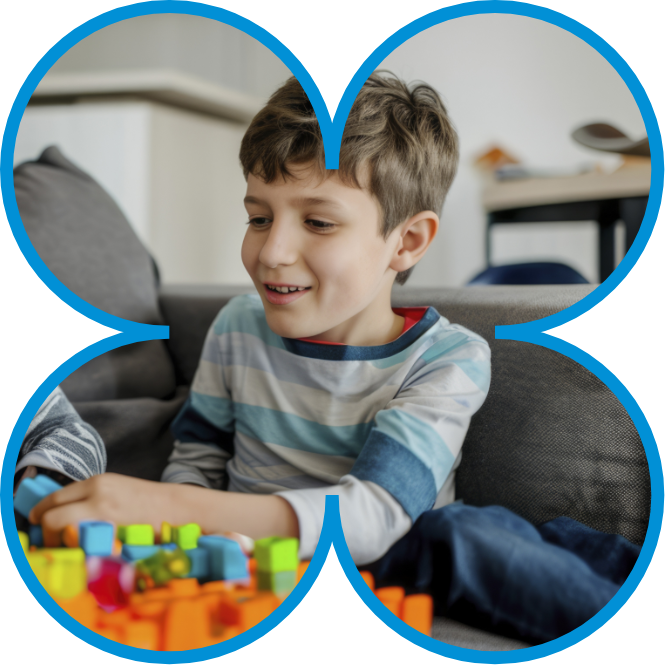We provide services that are unique to each individual, and the focal point of our mission is supporting children with autism and providing guidance for their families.



Applied Behavior Analysis (ABA) is an evidence-based therapy that uses behavioral modification for those who have been diagnosed with autism spectrum and related disorders. These treatment plans offer behavioral, cognitive, social, and executive functioning training and support that helps those with autism spectrum and their families to thrive.
Autism spectrum behaviors can span different areas of development and might present in varying degrees of severity. Our team of ABA treatment specialists can help children and their families to build skills and life experience that will allow them to succeed and grow with ease. ABA therapy uses foundational concepts like structured, stimulating play, as well as data-driven treatment protocols that offer patients the chance to learn in an environment that is ideal for
those with an autism diagnosis.
Therapy sessions using ABA therapy offer children the chance to play and learn at the same time. These sessions are filled with fascination, growth, and fun at every turn. These sessions also encourage curiosity and the chance to learn critical skills each day. Children engaged in ABA therapy will learn the following key skills:
ABA therapy offers children and their families the chance to pursue happiness, safety, and independence. If you are ready to learn more about ABA therapy services, schedule an evaluation with our experienced team. We are always ready to speak with you and are eager to help you and your child learn and grow.


Occupational therapy is one of the cornerstones of autism spectrum support. This treatment protocol offers support for cognitive, physical, social, and motor skills. The goal of OT is to improve everyday skills. Everyday skills are necessary for those living with autism spectrum and related disorders so that they can become independent and participate in the activities that bring them joy and fulfillment.
Occupational therapy lets those with autism focus on play skills as well as learning strategies and self-care. OT also helps to manage and support sensory issues. Occupational therapists often begin the treatment process by evaluating the person’s level of ability in these areas. A treatment plan is then formed to help look at areas where the patient can improve. The evaluation process looks at the following factors during the assessment period:
The evaluation process will look at obstacles that might prevent the patient from developing new skills. These are the obstacles that will need to be focused on during treatment. Some common goal examples include:
OT sessions are typically half an hour long, but sometimes, sessions might be an hour to work on specific skills. The skills that are targeted during these sessions can be utilized and practiced at home when patients are with their families or caregivers.
Development of the necessary skills to thrive is an important part of our treatment plans. We believe that developing independence and self-awareness can help those with autism and related disorders to gain confidence and feel secure each and every day.


Speech and language therapy addresses challenges with language and communication. This therapy can help those with autism to improve their verbal, nonverbal, and social communication skills. The overall goal is to help the person in treatment communicate in more useful and functional ways.
Communication and speech-related therapy challenges can vary from patient to patient. Some patients with autism spectrum are not able to speak at all. Others are very talkative but have trouble talking with others or communicating their needs. The goal of this therapy is to allow patients to communicate more effectively with others.
A speech therapy program always starts with an evaluation by a speech-language pathologist to assess the patient’s communication strengths and challenges. The SLP will then create a treatment plan that offers individual goals and milestones for patient progress. The skills that are taught and developed during these sessions can be practiced at home with family as well.
Common goals include improving spoken language, learning nonverbal skills like signs or gestures, and learning to communicate via alternative methods like technology or the use of pictures.
Speech therapy often focuses on the following skills:
This kind of therapy also helps with social skills and alternative methods of communication. There are many treatment modalities that can allow those with autism spectrum to communicate effectively with others, and speech therapy explores them all.


Center-based therapy is a variant of ABA therapy. This approach offers early intervention support for children with autism or related diagnoses. This kind of therapy takes place in a treatment locale where there are often other patients with whom to interact. Some of the sessions that are included in a center-based therapy protocol might take place at home, but the goal of center-based care is to immerse the child in an environment that fosters learning and
development.
There are no patients that are alike, and treatment for those with autism spectrum always needs to be tailored to the needs of each patient. Sharing space with others with autism spectrum and related disorders can help patients to try out new skills and learn to explore new ways of communicating and caring for themselves. Socialization is just as important as individual training and teaching.
Center-based care offers enhanced supervision and consultation. This kind of treatment also helps care providers to observe the growth and development of new skills and collect data to help refine and improve treatment protocols in the future. Center-based therapy can also help patients to be pushed out of their comfort zone so that they can learn independently and gather life experiences that will help them to be more confident and secure in their own skills.
Professional support staff can help to guide treatment protocols and can offer examples and training to those who provide ongoing support to patients at home. Center-based care can be the perfect solution for patients of all ages and can offer those with autism and related disorders to learn to thrive in a real-world environment that fosters immersive and advanced learning on a regular basis.


Patients at Spectrum Solutions will be supported in their personal treatment goals not just during center-based experiences, but also at home. A cornerstone of our therapy is ensuring that patients and parents are armed with the right tools and knowledge to foster growth and development at home.
Caregivers, siblings, and family members of all shapes and sizes are welcome to come learn about the treatment modalities that are being used for patients during center-based sessions. We offer training with those who provide care and support for our patients to ensure that they feel prepared to help their loved ones to thrive at home as well as in sessions.
Our care teams also offer support groups, sessions, and access to other resources so that caregivers and parents are able to get the help that they need to care for their loved ones. We believe that autism care and guidance work best when delivered by a cohesive group of supportive people, and we ensure that our parents and guardians are able to get the help and training that they need.
We take a holistic approach to providing autism spectrum support, and we ensure that everyone is involved in creating and supporting treatment plans that deliver big results for our patients.
